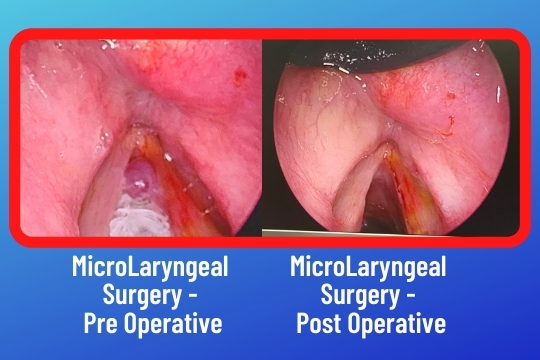Micro Laryngeal Surgery

Microlaryngeal surgery is a common otorhinolaryngological procedure that is relatively safe.
WHEN IS SURGERY NEEDED
Fortunately, surgery for vocal difficulties is rare; most voice disorders may be addressed with drugs or voice therapy. There are, nevertheless, some circumstances in which surgical procedures are required. Some benign lesions of the vocal folds, such as cysts or polyps, may not respond to more conservative treatment and ultimately require surgery. Surgery is also required to biopsy or treat laryngeal lesions that are suspected of being cancerous.
Microlaryngeal Surgery
Microlaryngeal surgery is a minimally invasive procedure for biopsying and removing granulomas and benign cysts from the larynx. It's frequently done to treat or diagnose laryngeal cancer or to remedy vocal problems. Despite being performed as an outpatient treatment, the majority of microscopic voice surgery procedures are performed under general anaesthesia to reduce the risk of gagging or breathing issues. Patients who have microlaryngeal surgery usually recover faster than those who have more standard laryngeal surgery. In terms of voice quality, they also do better.
A laryngoscope, a thin illuminated tube with a camera on the end that allows the
doctor to visualise the area with high precision, is used to perform microlaryngeal surgery. The surgeon removes the abnormal growth using tiny surgical tools threaded through the laryngoscope to the damaged site after the laryngoscope is put through the nose into the throat and the lesion is detected. Only the injured tissue is removed using this procedure because it allows the surgeon to do the operation with high precision. The surrounding region has not been damaged in any way.
The patient is observed for many hours after the treatment before being sent home. Most patients suffer some discomfort following surgery, but over-the-counter pain medications usually work effectively. A corticosteroid may be recommended for short-term use if the pain is severe. To ensure that stomach acid does not damage the healing tissue, acid reflux medication may be prescribed. During the first few weeks after surgery, complete voice rest is required. Voice treatment is commonly administered after surgery to aid in the improvement and maintenance of voice quality.
While microlaryngeal surgery is extremely safe, it does come with some risks, as does any surgery. These include the risk of an adverse reaction to the general anaesthetic or drug, as well as the development of respiratory issues, particularly in patients who already have heart or lung problems. The pressure of the laryngoscope can cause pain or numbness in the tongue or lips, as well as, in rare cases, tooth harm.
Book Appointment
